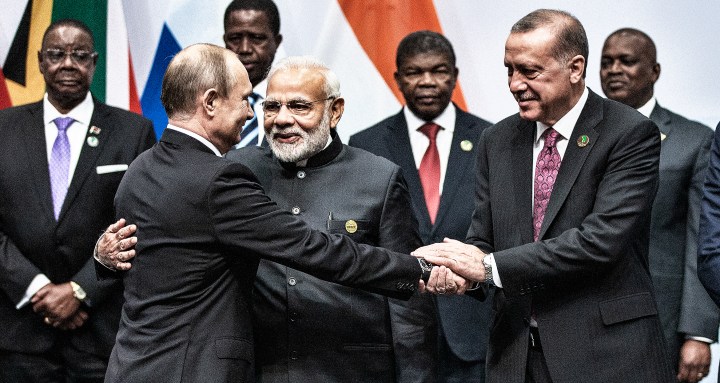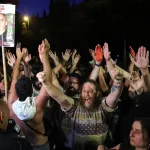OP-ED
What BRICS leaders should have talked about

As they met in Johannesburg, BRICS leaders should have addressed the many human rights issues that prevail in their respective countries.
South Africa hosted the 10th annual BRICS Summit last week, which saw heads of state, leaders, business and civil society organisations from Brazil, Russia, India, China, South Africa as well as other countries converging on Johannesburg.
On the agenda this year, BRICS leaders focused on the economy, development, peacekeeping, health and industrialisation issues within the bloc. However, the focus on economic agendas overshadows equally important issues such as the protection and realisation of human rights in the respective countries.
Collectively accounting for 40% of the world’s population, BRICS countries have a significant opportunity to bolster human rights globally. But leaders from these BRICS countries have failed to demonstrate strong political will and leadership to stem the tide of human rights violations and abuses occurring in their countries.
As they met in Johannesburg, BRICS leaders should have talked about the fact that without respect for human rights, genuine socio-economic development will remain a pipe dream. The meeting in Johannesburg also should have addressed the many human rights issues that prevail in their respective countries.
Brazil
Brazil has one of the highest murder rates in the world, with around 60,000 people murdered each year. Firearms are responsible for most homicides in Brazil and fewer than 8% of cases are brought to justice. Brazil’s failure to protect black Brazilians from police violence remains critical as this year marks the 25th anniversary of the Candelaria killings. The tragedy, in which eight young black boys were killed by off-duty police officers in Rio de Janeiro in 1993, represents the endemic racism within the Brazilian security forces.
The situation was aggravated by the murder of Rio de Janeiro human rights defender and councilwoman Marielle Franco on 14 March 2018. Marielle was the only black lesbian woman from the favela in the city’s parliament. Every day that goes by without an answer to this brutal crime increases the risks faced by other defenders in a country with one of the highest number of human rights defenders killed in the world. Brazil should combat racism and homicides, and prioritize the necessary pursuit of justice.
Russia
Russia has just enjoyed a month of worldwide attention as it hosted the FIFA World Cup. Behind the revel of the tournament, human rights defenders and civil society activists continued to face harassment, intimidation and arbitrary arrests across the country. The trial of human rights defender Oyub Titiev started in Chechnya. He, like several other human rights defenders, is being prosecuted on trumped-up criminal charges. Law enforcement agencies continue to launch cases on fabricated “extremism” and “terrorism” charges.
The Ukrainian film director Oleg Sentsov, serving 20 years on “terrorism” charges, is on day 75 of a hunger strike demanding the release of “64 political prisoners from Ukraine”. The right to freedom of peaceful assembly has been increasingly restricted in Russia since 2012 and remains under severe clampdown. Both the FIFA Confederations Cup in 2017 and the World Cup in 2018 have been used by the Russian authorities as an excuse to introduce more severe restrictions on public assemblies. The rights of LGBTI people are trampled upon daily and the authorities continue to refuse to investigate the horrific gay purge in Chechnya. The World Cup has come and gone, but the suppression of freedoms and shrinking of civil liberties continues unabated.
India
It’s a similar story in India where human rights defenders are consistently under threat, attacked and threatened, often from security forces. India has witnessed horrific instances of alleged extrajudicial executions by security forces for years as police and federal forces have effective immunity from prosecution. In the North-Eastern state of Manipur, human rights defenders who have lost their loved ones in alleged extrajudicial executions and are now campaigning for justice, face unprecedented attacks. Salima Memcha, a widow who lost her husband to an alleged extrajudicial execution, was verbally threatened by security personnel. Her house was also vandalised by them. Three other human rights defenders in Manipur have faced similar reprisals for campaigning for justice for their loved ones.
China
In China, the government continues to enact repressive laws under the guise of “national security” that present serious threats to human rights. Nobel Peace Prize laureate Liu Xiaobo died in custody whilst other human rights defenders are detained, prosecuted and sentenced on vague charges such as “subverting state power”, “separatism” and “picking quarrels and provoking trouble”. Controls on the internet have been strengthened and freedom of expression and freedom of association are under attack.
South Africa
In the host nation, nearly a quarter of century after adopting arguably one of the most progressive constitutions in the world, the country is bedevilled by profound inequalities, which persistently undermine economic, social and cultural rights. Failures in the criminal justice system continue to present barriers to justice for victims of human rights abuses and violations, including the state’s failure to hold perpetrators accountable for the killing of 34 striking mineworkers in Marikana in 2012 by the South African Police Service. Access to sexual and reproductive health services remain a human rights issue as does the provision of quality education.
Given these glaring human rights violations happening within the bloc, the summit in Johannesburg should have been an opportunity to place human rights issues at the forefront of discussions. Leaders should have put their strength and influence to good use by leading the human rights charge at home and on the global stage. The question now is, did they? DM
Jennifer Wells is an Intern at Amnesty International South Africa focusing on justice and accountability.




















 Become an Insider
Become an Insider